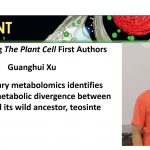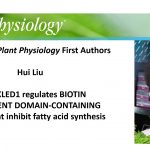Recognizing Plant Cell first authors: Jingjing Cao
Jingjing Cao, co-first author of Evolutionary metabolomics identifies significant metabolic divergence between maize and its wild ancestor, teosinte
Current Position: Assistant researcher at Institute of Plant Protection, Jiangsu Academy of Agricultural Sciences, China
Education: PhD in Botany, School of life science, China Agricultural University
Non-scientific Interests: Running, reading, and traveling
Brief bio: During my postgraduate study, my project was about investigating the effects of MeJA on Arabidopsis metabolome under endogenous JA deficiency. The results showed that glucosinolates and tryptophan metabolism, amino acids and small peptides metabolism, lipid metabolism, especially fatty acyls metabolism, were impacted by endogenous JA deficiency and exogenous MeJA treatment. In addition, QTL mapping on metabolic traits were used to provide genetic and biochemical insights into domestication of maize. I joined the Weed Damage and Pesticide Application Laboratory of Jiangsu Academy of Agricultural Sciences since 2017, at where I am now focusing on the study of the succession pattern of weed damage and the mechanism of weed herbicide resistance of barnyardgrass (Echinochloa crus-galli) in paddy fields.
姓名: 曹晶晶
现任职位:江苏省农业科学院植物保护研究所助理研究员
教育:中国农业大学,植物学,理学博士
兴趣爱好:跑步,阅读,旅游
个人简介:我在研究生学习期间主要的研究内容是使用代谢组学的方法,研究茉莉酸对拟南芥代谢组的影响,结果表明硫代葡萄糖苷与色氨酸代谢、脂类代谢、氨基酸、小肽等都受到了茉莉酸的调节。此外,结合代谢组学与遗传连锁分析解析玉米的驯化过程,鉴定到大量玉米与大刍草间分化的代谢物,并对重要的代谢物进行遗传解析。2017年,我加入了江苏省农业科学院草害与农药应用研究室,开展杂草抗性机理的研究。我以水稻田危害最严重的稗草为研究对象,分析其对不同作用方式的常用除草剂产生抗性的程度,并使用分子生物学、遗传学等方法研究其抗性产生的原因。




